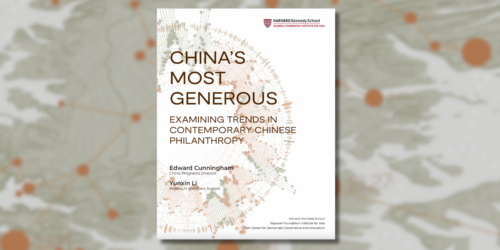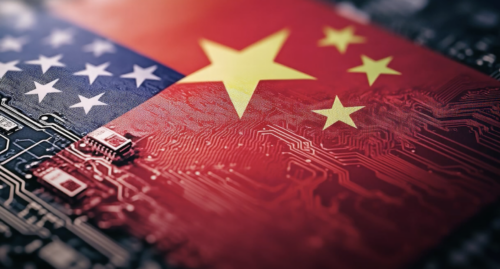Ash: Why should creating an effective policy for dealing with China top the foreign policyagenda for the new administration?
Anthony Saich: I think there’s a general consensus in Washington that China presents the most significant geopolitical and strategic challenge to any administration moving forward. However, there are considerable differences in how to deal with that challenge. Should it be through competition? Should it be through confrontation? Or should it be with containment? Or should it be a mixture of any one of those three?
Ash: If you were advising the new administration on China policy, what kind of strategy would you encourage them to pursue?
Saich: In terms of advising the administration as it comes in, I think there are three basic principles that one can bear in mind:
The first is rather than simply banning Chinese organizations and Chinese apps, we should push for reciprocity. Remember it was China that began decoupling by banning Facebook, Google, and other operators from the West. Now it’s also clear that things like Google have far more effective search engines and those which are in China, such as Baidu, for example. And so, I think one thing should be reciprocity, to push for genuine competition.
The second principle is, it’s very difficult to go alone in meeting the challenges and demands from China. I think the administration should seek to try and build alliances of the aggrieved and the willing to put pressure on China to conform to those obligations the country has said it is committed to, particularly after entering the World Trade Organization. That is one thing China fears most, it doesn’t like feeling it’s being ganged up upon and would rather act one-on-one, rather than in multilateral environments.
And thirdly, I think one should look for those areas where cooperation might be conceivable. For example, in the realms of new global public goods dealing with climate change, dealing with the pandemic, dealing with the challenges to the ocean, and so forth.
Ash: Why do you caution against trying to decouple from China?
Saich: A complete decoupling from China is impossible. It may be possible in certain areas. Certainly, Foreign Direct Investment (FDI) is dropping, trade will rebalance and will not be as extensive as it is currently but, for example, if one looks at the financial sector there’s about a $5 trillion engagement in that sector. China desperately needs access to global financial markets. Also, US financial institutions are hoping still to be able to enter China more effectively and make greater profits.
Ash: How does Beijing view Biden’s election and do they think the election will lead to a change in US policy towards China?
Saich: I think the attitude in China has been shifting. While many had presumed that they might find the Biden administration more amenable, I think they’re coming to the conclusion that a Biden administration will be different, but equally as tough to deal with as a Trump administration. The Biden administration would not have the unpredictability, but I think they have a sense that the Biden administration might try to build international coalitions and might also put pressure on its business practices, creating a level playing field, but also question China’s human rights protection and religious freedom.
Ash: If major global challenges, like climate change, are potential opportunities for collaboration with China. What should the new administration know about China’s stance on climate change?
Edward Cunningham: Broadly speaking, China’s peak emissions are targeted in nine years. So, by 2030. And then aiming for carbon neutrality in 2060. And that’s largely through the development of carbon markets and other forms of green finance and upgrading environmental energy technologies, reducing energy demand, and diversifying energy supply. These sort of broad outlines of China’s climate stances I think are quite known.
In reality, of course, no one really knows the details as the 14th five-year plan is currently quite broad. At this current juncture, the new administration really should try to maintain a laser focus on a growing dichotomy between China’s record climate record at home and climate record abroad.
China’s developing the world’s largest wind and solar and electric vehicle markets, among others, but much of that is mitigated by the fact that China continues to consume half the world’s coal and produces well over double the carbon emissions of the United States abroad. Chinese companies continue to build a vast capacity of fossil fuel infrastructure. I think that paradox is what should inform US climate action moving forward concerning China.
Ash: What would be your first step when developing a plan or proposal for collaborative action to combat climate change in conjunction with China?
Cunningham: The ground obviously has shifted considerably in US-China relations towards competition. The optimist in me believes that these challenges of the global commons and climate, in particular, may be actually one of the few areas that can benefit from heightened competition in one sense. I think US climate actions towards China probably will need to play out on two levels, domestic and international.
The US has now come to fully embrace that it systematically has to compete with China in the sustainability space. Yet, if you’re not a major market for electric vehicles, advanced storage, sophisticated demand response, and efficiency standards, you can’t lead, you can’t really compete. So clearly, there will need to be sweeping domestic changes. A rollback of Trump-era executive orders, but also a much more robust series of incentives and penalties, much more aggressive than Obama-era policies.
I think it’s also why we’ll probably have some form of climate council, you know, to join those national security, economic coordinating bodies. If we have clean Energy R&D, replacement of aging inefficient energy infrastructure and a whole bunch of other things, that pivot domestically will be noted in Beijing and perhaps more importantly within Chinese investment funds energy infrastructure companies and then other corporate actors.
I think internationally when it comes to global governance, we can combine that competition with some limited engagement. And so, in terms of competition, Chinese energy companies are building so much abroad that is fossil-fuel based, I think here we really do need to have a much more well-resourced and active US Development Finance Corporation to provide some alternative financing in the developing world, particularly in the areas we care about in South Asia, Southeast Asia. And at the same time really focus on the goals of what a multilateral world can be under clearly competing regional trade agreements.
When it comes to trade, I think the US probably needs to be smart in how and where we compete. So ironically, you know, trade may be an area where we can get some fast short-term traction. So, if it’s jobs that we care about, particularly given the current crisis. Well, there are not many jobs in the manufacturing of solar panels, but many jobs in the installation of solar panels. And that demand is fueled by low prices.
I think the phase one trade deal actually between the US and China began to lower a lot of these tariffs in a way that was quite logical that should be accelerated. Then those openings to reduce trade tariffs in these areas where we know we shouldn’t be competing through tariffs. I think that would be welcomed by Beijing and create some momentum that can be leveraged to address other issues like subsidies, fishing fleets, and other threats to the global commons.


